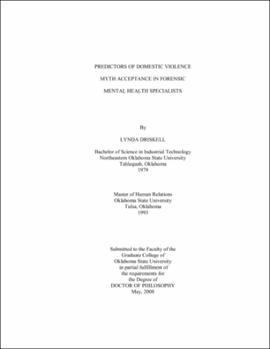| dc.contributor.advisor | Carlozzi, Barbara | |
| dc.contributor.author | Driskell, Lynda Denise | |
| dc.date.accessioned | 2013-11-26T08:34:23Z | |
| dc.date.available | 2013-11-26T08:34:23Z | |
| dc.date.issued | 2008-05 | |
| dc.identifier.uri | https://hdl.handle.net/11244/7374 | |
| dc.description.abstract | Scope and Method of Study: The purpose of this study is two fold (a) to make a contribution to the existing body of literature in the field of violence against women by identifying predictors of domestic violence myth acceptance in forensic specialists, and (b) to test the hypothesis that domestic violence myth acceptance by forensic mental health practitioners can be predicted by gender, empathic disposition, and hostile or benevolent sexism. This study will show that gender influences dispositional empathy and hostile sexism, and that traditional gender role expectations are related to domestic violence myth endorsement in forensic specialists. 138 forensic mental health specialists from the American College of Forensic Examiners Institute were surveyed on their perceptions of violence in intimate relationships. Instruments included The Domestic Violence Myth Acceptance Scale, Interpersonal Reactivity Index, Ambivalent Sexism Inventory, and the Crowne-Marlowe Social Desirability short form. Multiple regression, bivariate correlations, and ANOVA were used in the analysis to predict domestic violence myth acceptance in the sample respondents. | |
| dc.description.abstract | Findings and Conclusions: Separate regression analyses were conducted by gender. The regression analysis for female respondents revealed that the model was significant and women lower scores on the DVMAS were driven by their higher scores on the Empathic Concern subscale (R2 = .177, F [1,42] = 9.043, p = .004). Approximately 18% of the variance in domestic violence myth acceptance was accounted for by the females' empathic concern for others. Gender and empathic concern, (IRI subscale) were predictors of low scores on domestic violence myth acceptance in females. The regression analysis for male respondents revealed that the model was significant and men's higher scores on the DVMAS were driven by their scores on the Hostile Sexism subscale of the ASI (R2 = .224, F [2,80] = 11.564, p = .000). Approximately 22% of the variance in domestic violence myth acceptance was accounted for by the males' hostile sexism towards women, supporting the hypothesis that gender and hostile sexism were predictors of domestic violence myth endorsement. | |
| dc.format | application/pdf | |
| dc.language | en_US | |
| dc.rights | Copyright is held by the author who has granted the Oklahoma State University Library the non-exclusive right to share this material in its institutional repository. Contact Digital Library Services at lib-dls@okstate.edu or 405-744-9161 for the permission policy on the use, reproduction or distribution of this material. | |
| dc.title | Predictors of domestic violence myth acceptance in forensic mental health specialists | |
| dc.contributor.committeeMember | Bull, Kay | |
| dc.contributor.committeeMember | Zhao, Gouping | |
| osu.filename | Driskell_okstate_0664D_2755 | |
| osu.accesstype | Open Access | |
| dc.type.genre | Dissertation | |
| dc.type.material | Text | |
| thesis.degree.discipline | Educational Psychology | |
| thesis.degree.grantor | Oklahoma State University | |
